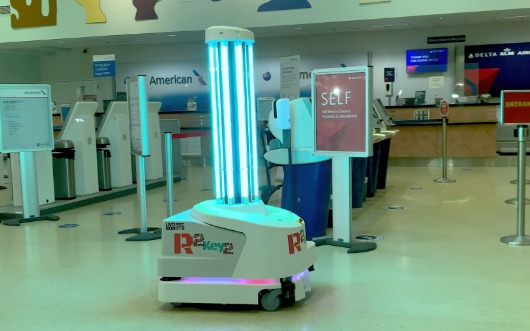
Key West Airport has now announced the name of its Coronavirus-Fighting Robot. The naming of the robot that disinfects interior spaces of the airport was chosen following an online contest that attracted 1,000 entries — its maximum limit — in about six hours.
And, drum roll, please, the name selected by a committee of Florida Keys officials from a dozen finalists, is “R2Key2” … which salutes both fictional robots and the unit’s Keys location.
Key West International was among the United States’ first airports to implement one of the unique robots, debuting it in December.
The unit emits high-intensity ultraviolet UV-C wavelength light designed to remove 99.9% of harmful airborne and surface pathogens including the novel coronavirus.
The nearly 6-foot-tall robot patrols the terminal and other interior spaces during nighttime hours after the airport closes to the public. It even plays music while making its rounds.
“R2Key2” was submitted by Chelsea Atkins of Bat Cave, North Carolina. Atkins won a Key West vacation that includes two airline certificates on JetBlue and accommodations at The Gates Hotel Key West for three nights. The prize also includes attraction passes from the Key West Butterfly & Nature Conservatory, Historic Tours of America and Sebago Watersports.
The “name the robot” contest, staged Jan. 14, was part of the Florida Keys tourism council’s initiative to promote directives and safety protocols in place in the Keys to combat COVID-19, including mandatory masking requirements.
Keys Mayor Michelle Coldiron, who helped judge submissions and is also a tourism council board member, observed that: “While naming the robot is lighthearted in its nature, what we really are concerned about, and make a priority here in the Florida Keys, is protecting the health of our residents and our tourists.”
And Coldiron added: “The robot is now keeping the Key West International Airport cleaner and safer for all who come through the Florida Keys.”
“R2Key2” moves around the airport autonomously when people are not present, since the light it emits during the active disinfection cycle is intense — and supplements other cleanliness and passenger protection practices. It can disinfect the entire interior space in approximately 2.5 hours.
Other judges included Richard Strickland, the island chain’s airports’ director, and Bob Eadie, the director of the Keys’ state health office.
